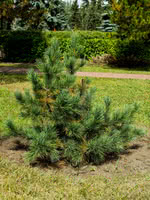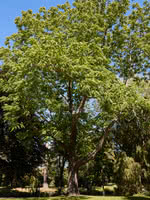Mon-Fri 9am - 5pm Mountain time
Swiss Stone Pine vs Black Walnut
Pinus cembra
Juglans nigra
NOT AVAILABLE THIS SEASON - MIGHT RETURN
NOT AVAILABLE THIS SEASON - MIGHT RETURN
Swiss Stone Pine is a hardy, slow-growing evergreen. Narrowly pyramidal while young, this long-lived tree is adaptable to many soil types. Due to its shape and density, Swiss Stone Pine is a versatile shade or accent tree.
Although our pictures don't show it, this seldom seen tree is among the most attractive conifers we have seen and is likely why it is the most chosen tree used for memorials or dedications in public parks.
Swiss Stone Pine is also sought after for the large seeds it produces. They are often used as pine nuts are and are tasty in pesto.
The Black Walnut is a slow growing, large, straight-stemmed tree with an open crown. It produces dense, very hard, edible nuts.
Black Walnut has a deeply-furrowed, black bark. Its leaves are about 1 foot long, composed of 15 - 23 slightly stalked leaflets on a moderately stout stock which provide good dappled shade.
Despite being highly valued for its edible nuts and its shade tree aesthetics, it is rare to see this tree on the prairies.
Note: Black Walnut's roots produce a substance named juglone that is toxic to some other plants. Consider this when choosing where you plant a black walnut, as you will not be able to grow tomato, potato, cabbage, eggplant, blueberry, azalea, rhododendron, lilac, red pine and apple in the surrounding area.
Note: Plant this tree once. It will not respond well to transplanting.
Note: Although self-pollinating, planting two trees significantly improves nut production.

